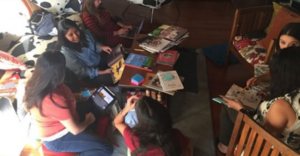 Through a CERCLL project, Worlds of Words offers annual grants for Global Communities–groups of educators that meet regularly to consider global literature, world languages, and ways of using these books in preK-12 classrooms. We are excited to announce that the most recent issue of their peer-reviewed journal (WOW Stories: Volume VIII, Issue 2) describes the work of some of these communities over the last year.
Through a CERCLL project, Worlds of Words offers annual grants for Global Communities–groups of educators that meet regularly to consider global literature, world languages, and ways of using these books in preK-12 classrooms. We are excited to announce that the most recent issue of their peer-reviewed journal (WOW Stories: Volume VIII, Issue 2) describes the work of some of these communities over the last year.
From project director Dr. Kathy Short’s introduction:
“This issue of WOW Stories: Connections from the Classroom includes seven vignettes that highlight seven global literacy communities located in rural and urban communities in different regions across the U.S. and in elementary, middle school and high school contexts. Each community consists of educators committed to the use of global literature with students and with explorations of language and culture across global contexts, often in response to the diversity of students in their communities and schools.
“The first vignette focuses on the work of teachers from different districts in Washington, the Whatcom County Global Literacy Community. They share three stories: a sixth-grade unit on immigration, a second-grade unit on Sikh religion and Punjabi culture, and an after school club for middle school students on Japanese language and culture. The second vignette comes from a group of K-4 educators in Tennessee, the J.E. Moss Global Literacy Community, and focuses on their work with a journey text set to analyze illustrations in picturebooks and learn “how to read” visual images.
“The next three vignettes highlight explorations of culture and language, particularly their search for books written in a range of languages. A global literacy community in Detroit shares their work in a PreK-12 Spanish/English dual language immersion school to engage middle school students in Spanish books set in Central American contexts. The Lakeside Global Community in San Diego consisted of teachers from a Spanish language immersion program in several elementary and middle schools. Their primary goal was to find new sources of children’s literature, particularly authentic literature from Latin America, instead of English literature translated into Spanish. The third vignette is from the Civic Center Global Literacy Community, a group of Grade 7-12 educators in an alternative school in San Francisco. Their focus was on finding ways to engage students, many of whom had long histories of negative experiences with books, and they share a range of strategies, including a field trip to a Japanese bookstore.
“The final two vignettes highlight the roles of literacy coaches and media specialists in engaging students and teachers in global literature. A group of literacy coaches in a Utah global literacy community came together to read and discuss global books for which they developed demonstration lessons to share in classrooms across their school district. In the last vignette, a rural Wisconsin global literacy community of K-12 teachers and the media specialist planned classroom units and events, such as a Reading Rampage, to introduce global literature into their classrooms.”
➣ Access their stories here: https://wowlit.org/on-line…/stories/volume-viii-issue-2/
In addition to funding from Worlds of Words and CERCLL, these grants are also supported by the University of Arizona College of Education, the Center for Middle Eastern Studies and the Center for Latin American Studies.
Details about Global Communities applications are here, and will be updated when the project is accepting applications for the next academic year, usually in early summer.
.
 Through a CERCLL project, Worlds of Words offers annual grants for Global Communities–groups of educators that meet regularly to consider global literature, world languages, and ways of using these books in preK-12 classrooms. We are excited to announce that the most recent issue of their peer-reviewed journal (WOW Stories: Volume VIII, Issue 2) describes the work of some of these communities over the last year.
Through a CERCLL project, Worlds of Words offers annual grants for Global Communities–groups of educators that meet regularly to consider global literature, world languages, and ways of using these books in preK-12 classrooms. We are excited to announce that the most recent issue of their peer-reviewed journal (WOW Stories: Volume VIII, Issue 2) describes the work of some of these communities over the last year.
